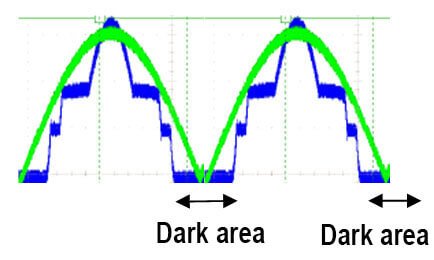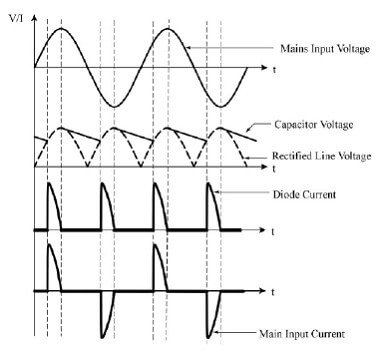Firstly, it is about the origin of the problem.
There are two kinds of light engines on the market today, one is high-PF but no electrolytic capacitors with serious flashing light engine, the other kind is flicker-free with a low PF electrolytic capacitor light engine. So in the end what kind of light engine is better?
Secondly, it is about the cause.
Silicon Valley company ExClara invented a LED system, in order to improve the power factor PF, not only removed the electrolytic capacitor, and in order to make current and voltage waveforms exact match, using the LED string which will be divided into several groups and are sequentially turned on . The result must be a LED illuminated intermittently cause serious flicker.
 Thirdly, it is about the degree of flicker.
Thirdly, it is about the degree of flicker.
LED inherently requires a certain start-up voltage (2V above) to be turned on now and then now have to wait for the input voltage rises beyond a certain height. This is bound to have a big dark area in the middle of two and a half sine wave. (see figure below arrow zone), so that it flashes more serious than other lamps (such as incandescent, fluorescent).
Fourthly, the consequences and problems caused by flicker.
- Effect on the human body:
- Will produce strain fatigue, blurred vision, headaches;
- Can cause photosensitive epileptic seizures in patients;
- An increase in repetitive behaviors among children with autism.
- Impact on production workers
- Workers with visual acuity requirements related jobs will lead to a decline in performance;
- Those workerswho use or contact with rotating machinery will have to rotate slower, stop or even reverse the effects, sometimes can cause serious accidents.
- ImpactonSportsman.
To those table tennis and badminton athletes with high speed movement, because every 1/100 of a second will be 2ms darkness, this light flashes often causes the ball misjudgment direction and other issues.
- Influence of Art photography
- Leave streaks on the photo;
- Long exposure shots will produce strange face when moving shooting.
- The impact of video, television, film production
Light flashing has a bad effect on the television drama production quality, ghosting and interference fringes that can not be played.
- Impact on the security, alert system

Because the imaging instant camera is possibly just in the dark, at this time the black image- “complete loss of one” will be an important piece of evidence if it happened to the mob attack.
Fifthly, how to eliminate flicker.
The most thorough way is to eliminate the root causes of such brightness flicker. That is completely filtering out this AC ripple after the rectifier electrolytic capacitor filter.
After the electrolytic capacitor filter, the rectified sine wave becomes substantially near DC waveform, only a small ripple left. The larger capacity of the electrolytic capacitor, the smaller the ripple it will be. In other words, all the flashes basically eliminated.
 Sixthly, the “disadvantage” of using electrolytic capacitors– low PF.
Sixthly, the “disadvantage” of using electrolytic capacitors– low PF.
Why is this “disadvantage” to put quotation marks? Because this test result is from those problematic power factor measurement! And the test results of these power factor measurement is very doubtful.
For example, we use the same 102W LED light engine system with an electrolytic capacitor, tested by different instruments in the market, the result is power factor of 0.6590.
But if we adopt the national CHNT identified Cosφ meter to test the same system, the results can be obtained PF = 0.9. It is obviously showing that there should be a problem of the digital power factor measurement.
Seventhly, no electrolytic capacitor flashing light engine has more serious problems.
The biggest problem is that it uses a very inefficient linear power supply, its efficiency is only 85%. 15% of the power is turned into heat. If this inefficient linear power into the aluminum substrate made of a light engine, then it would have 15% of the heat added to the LED above. Let’s have 10W light engine to be an example. Remove 1.5W power consumption, only 8.5W LED supply, actually LED elector – optical efficiency of 40%, that would have been the heat 8.5×0.6 = 5.1W and 1.5W of heat now added, is to increase the 1.5 / 5.1 = 0.3, representing an increase of 30 percent of calories. Also makes the LED junction temperature is increased by 30%. Under normal circumstances the design of the radiator should make a junction temperature of 85 degrees, and now increased to 110 degrees, so that it will be hot light efficiency reduced by 25%, reduced life from 30,000 hours to 10,000 hours.
Konklusjon
You should now be able to clearly conclude that: the advantage of flicker-free, high-performance light engines is much more higher than the so-called high PF serious flashing light engine!


